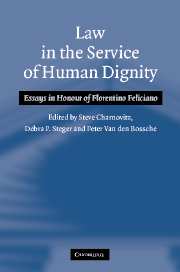Book contents
- Frontmatter
- Contents
- List of contributors
- Preface
- Biographical note
- List of abbreviations
- PART I Reflections on the contributions of Florentino Feliciano to international law
- PART II Insights into the World Trade Organization
- PART III The changing landscape of investment arbitration
- PART IV New challenges in international adjudication
- 21 From Preston to Prescott: globalizing legitimate expectation
- 22 The independence of the international judiciary: some introductory thoughts
- 23 ‘Straddling and highly migratory flags’ before the International Tribunal for the Law of the Sea
- 24 Collective security and the personalization of peace
- 25 Some thoughts on ‘Asian’ approaches to international dispute resolution
- 26 The Cameroon v. Nigeria; Equatorial Guinea Intervening (Land and Maritime Boundary) Judgment
- Bibliography of works by Florentino Feliciano
- Index
24 - Collective security and the personalization of peace
from PART IV - New challenges in international adjudication
Published online by Cambridge University Press: 29 July 2009
- Frontmatter
- Contents
- List of contributors
- Preface
- Biographical note
- List of abbreviations
- PART I Reflections on the contributions of Florentino Feliciano to international law
- PART II Insights into the World Trade Organization
- PART III The changing landscape of investment arbitration
- PART IV New challenges in international adjudication
- 21 From Preston to Prescott: globalizing legitimate expectation
- 22 The independence of the international judiciary: some introductory thoughts
- 23 ‘Straddling and highly migratory flags’ before the International Tribunal for the Law of the Sea
- 24 Collective security and the personalization of peace
- 25 Some thoughts on ‘Asian’ approaches to international dispute resolution
- 26 The Cameroon v. Nigeria; Equatorial Guinea Intervening (Land and Maritime Boundary) Judgment
- Bibliography of works by Florentino Feliciano
- Index
Summary
Contemporary international political and legal environment
Although I have long admired the work of Justice Florentino Feliciano, I have met him only once. The meeting was, however, memorable because it provided a rare occasion where my professional and family lives crossed. As Justice Feliciano and I walked together after dinner in Annecy, in France on a beautiful summer evening in 1990, we discovered a common admiration, affection, and respect for Anita Magsaysay Ho, the distinguished Filipina painter who is also my aunt. We recalled my aunt's deep love for the Philippines and her strong portrayals of Filipina women at work. Therefore, by honouring Justice Feliciano, I hope to honour, in a small way, the beautiful land that he served and that I came to know through my aunt's eyes.
Flashed across the front pages of newspapers and magazines across the world, the image of a man dressed in a white shirt and black trousers facing down a tank on one of the main avenues of Beijing during the Chinese government's crackdown of the pro-democracy movement in June 1989 is one of the more memorable photos of that dramatic event. However, the photo also represents the convergence of several worldwide ‘patterns of conduct’ that emerged from the twentieth century with important implications for the international system of the twenty-first century. These include the personalization and internationalization of activities previously thought to be exclusively within the purview of states.
- Type
- Chapter
- Information
- Law in the Service of Human DignityEssays in Honour of Florentino Feliciano, pp. 336 - 349Publisher: Cambridge University PressPrint publication year: 2005



